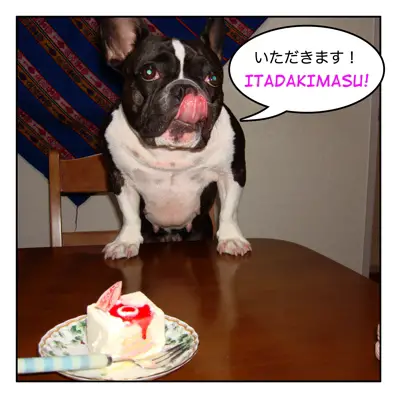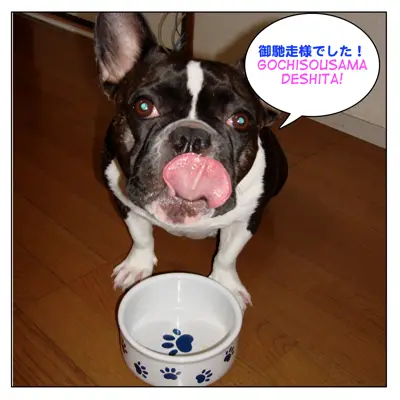
「いただきます!」
= Itadakimasu!
= (I’ll have this cake now)
今日は、皆さん!= Konnichiwa minasan! Hi, everyone!
Today’s lesson is about Japanese manners.
Japanese people say 「いただきます」 ( = Itadakimasu ) before they have meals at the table.
It means, “I will eat now!” “Dig in!” or “Let’s eat!”.
Many Japanese people say that automatically without thinking but
「頂きます」( = Itadakimasu )is a polite form of
「もらいます 」( =moraimasu) “to receive“
or
「食べます」( = tabemasu) “to eat“
It is originally meant to show your appreciation for life, nature, a person who cooks a meal, serves the food, or makes money to feed you, etc.
You put both of your hands in front of your chest or put them on your laps and say「いただきます」 ( = Itadakimasu)
People with good manners do that every meal when they eat with their family or when they are invited to other people’s houses as well.
Also, it is customary for children to say “itadakimasu” all together before eating lunch at school. 給食係 ( = kyuushoku gakari), a student who is in charge of lunch says
「手を合わせて下さい!」
= Te wo awasete kudasai.
“Put your hands together”.
And then all the kids say
「いただきます!」
= Itadakimasu
together out loud.

🔸 When you finish your meal, you should say
「御馳走様(でした)!」
= Gochisou sama (deshita).
Thank you for the delicious meal!
By saying that, you show your appreciation again to the person who serves, cooks, or provides the food.
The original meaning of ごちそう = 御馳走 ( = gochisou) is
![]()
御馳走 ( = gochisou) = a feast, a nice meal, good food, etc.
Ex. 「今日は御馳走だよ!」(casual)
= Kyou wa gochisou dayo!
= It’s a nice meal today!
Ex. 「今夜は腕をふるって御馳走を作ります。」
= Konya wa ude wo furutte gochisou shimasu.
= I will do my best to cook a nice meal tonight.
Ex. 「すごい御馳走ですね。」
= Sugoi gochisou desu ne.
= What a feast! / It looks great!
(Said as a compliment to a person who serves or cooks a nice meal for you.)
If someone treats you or invites you for a meal at their house, you should say
御馳走様(+でした)( = gochisou sama ( + deshita))
“Thank you for the nice meal!” after the meal.
Ex. 「昨日は御馳走様でした。」
= Kinou wa gochisou sama deshita.
Thank you for the meal yesterday.
(→This can be used when you are invited to someone’s family or when you are taken out to eat.)
Also when you treat someone you can also use this word.
The verb is 「御馳走する」 ( = gochisou suru), and when someone treats you, the action will be passive, 「御馳走になる」( = gochisou ni naru)
Ex. 今夜は私が御馳走します。
= Konya wa watashi ga gochisou shimasu.
= It’s my treat tonight!
Ex. この間、鈴木さんに御馳走になりました。
= Kono aida Suzuki san ni gochisou ni narimashita.
= Suzuki-san treated me the other day.
 マギー先生より = Maggie-sennsei yori From Maggie-sensei
マギー先生より = Maggie-sennsei yori From Maggie-sensei
今度、誰か御馳走してね。 = Kondo dareka gochisou shite ne.
Somebody treat me next time! 😉
***
Will you be my Patron?
I appreciate your support! サポートありがとう!



37 Comments
Hi! I would like to get Itadakimasu tattooed and I want to make sure I’m getting it correct. What would be the proper way: (頂きます)or ( いただきますま)
(頂きます)or ( いただきますま) →There is a typo いただきます
Both kanji and hiragana are fine but you usually use hiragana いただきます when you start eating something.
Why is deshita in parentheses?
You say both ご馳走様 or ご馳走様でした。 (A lot of time people drop でした)
It is slightly more casual than saying ご馳走様でした。
Thank you for this information. I’m wondering if there are times when gochisosama deshita is more appropriate than oishi katta desu, or vice versa? And if you can say both or if you should pick one over the other. Thank you.
Hi Jen,
When someone treats you,
“Gochisousama deshita” is better than just saying “Oishikatta desu”.
Or you can say both
Gochisou sama deshita & Oishikatta desu.
Very nice. Far beyond my level, I am afraid. For example, you, as most people do, write gochisousan but I noticed that some write it Gochisōsan (with a long mark over the o instead of an extra u. So what exactly is the pronunciation? Thanks. We have been enjoying the very good Japanese TV series of the same name on Lithuanian television, but I see it is now available online with insightful English subtitles. There are also a couple of good Japanese restaurants in the country and we would like to compliment the chefs in their native tongue.
Hello Arturas,
I don’t use long sound symbol here and type exactly the same way as romaji spelling but the pronunciation is “Gochisōsama” / “Gochisōsan” strech “o” sound lightly.
I think they use Osaka dialect in the the TV show, “Gochisōsan”. Enjoy the show! :)
wow sensei…. I’v learn lots about aisatsu… Thank you very much ….
GREAT!!! 😊 I’m glad to hear you learned something from this lesson!
Do you say “Gochisou sama deshita.”to who are sitting with or the workers?
Hello Jessica,
You say gochisousama deshita to the person who treated you, cooked for you.
It is not mandatory but you can also say gochisousama to the people who work for the restaurants/coffee shop.
Maggie-san, thank you for your lessons. Your site is very helpful and it’s fun to learn using it. I appreciate your time.
I had a question about itadakimasu and gochisosama deshta. What if you’re eating by yourself in a restaurant? Do you say them to the waiter who brings your food or only if you’re in a kind of restaurant where you interact with a chef? Thank you!
Hi Ami,
I am glad you enjoy learning Japanese.
OK, you don’t have to say anything to the waiters or chefs at all. However, as you said, if they are friendly, it would be nice to say “gochisousama(deshita)” or “oishikatta desu.” to them when you leave.
You don’t usually say “itadakimasu” when you eat by yourself.
!greenapple!
So how many stereotypes does Google assume about the Japanese language? because I’m using Google for some weapon chants in some stories and I don’t know how to correctly translate them from English to Japanese (not caligraphy) Plz reply ASAP..
@Crystal Rianna
Hi Crystal Rianna
So how many stereotypes does Google assume about the Japanese language? →I am sorry. I don’t know.
But what I can say is not to trust Google Translate. It sometimes works OK but they are not good at translating long complicated sentences.
ありがとうございます Maggiesensei! 💐
どういたしまして、Ami! 💕
MEEP I just found your website! d=I wanna learn more about Japanese language. Like, how many stereotypes does Google put in their translations?
Thank you so much. ご苦労様です,お疲れ様です and ごめいわく かけて もうし わけ ございませn
@Shu
boucingheart! boucingheart!
ありがと! You explain it so well.
@Margy
どういたしまして ❤
Maggie: I just found this website – it is wonderful! I love Japanese food and the way that your
society looks at politeness as part of a way of life. Appreciation of every grain of rice and every
gesture. Lovely, just lovely.
@Pat
Hello Pat,
Welcome to Maggie Sensei’s site!
Hope you visit here often. We have other Japanese food related lessons!
Maggie-sensei,
I’m at a Japanese elementary school, and before the children say “te wo awasete kudasai”, they usually say another phrase and I can’t quite make it out. It sounds something like “kyuushoku otobansan arigatougozaimasu”. What exactly are they saying?
I’ve been a fan of your site and I’ve just came across this post today. Thank you for all the wonderful lessons!
@ann
Hello Ann!
I guess every school has different version but your listening is very good.
That must be
給食お当番さん有り難うございます。
= Kyuushoku otoubansan arigatou gozaimasu.
給食= kyuushoku = school lunch
当番= touban = turn, duty
(The polite way : お当番さん= otouban san)
給食当番 = Kyuushoku touban = one’s turn to serve school lunches,
or a student who is in charge of helping serve school lunches
Thank you for the nice message!!! Hope you come back here again and again! :)
Usually students take a turn to help serve school lunch.
So other students express their appreciation towards them.
Hello Maggie sensei! Thank you so much for the great lesson’s; they’re always so insightful and informative. I have a question: if you are the person who is treating someone else, what is a polite and humble way to respond if they say ご馳走様でした to you? Also if you are the one who is again treating the other person, does it appear arrogant to say ご馳走様でした yourself or is it a way of expressing thanks (ie to God/the restaurant etc) at the end of the meal?
よろしくお願いします。
P.S I’m sorry for the long question! m(_ _)m
@Sarah86 Hi, Sarah! It is a really good question! I made this lesson a long time ago so I should add more inf.
If you treat someone, you don’t say 御馳走様でした。to the person you invited. But you can say that to the waiter, chef, restaurant owner when you leave.
★If you invite people, serve food and they say “御馳走様でした。” to you, you say ”
Ex. いえいえ、何のお構いもできませんで…
= Ieie nanno okamai mo dekimasen de.
= Not at all. I couldn’t serve you enough. (humble)
Ex. お口に合いましたか?
= Okuchi ni aimashita ka?
=Did it taste good enough for you?
Ex. お粗末様でした。
= Osomatsu sama deshita.
= It was a poor service/food. (lol!! I know this sounds too humble but our parents generation say that often.)
★If you take someone out and they say 御馳走様でした。to you, you could say
Ex. いえいえ、これ位のもので。お口に合ったらいいのですが..
= Ieie koregurai no mono de… Okuchi ni attara ii no desuga…
=Not at all. This is nothing. Hope this tasted good enough for you. (humble)
Ex. どういたしまして。私も楽しかったです。
= Douitashimashite. Watashi mo tanoshikatta desu.
= It’s my pleasure. I had a good time.
Ex. こちらこそ、お忙しい中、有り難うございました。
= Kochirakoso oisogashii naka arigatougozaimashita.
= ( It’s me who has to say thank you. Even though you were busy you made time for me.) Thank you for your time. (to someone superior)
Ex. どういたしまして。また美味しいもの(を)食べに行きましょう!
= Douitashimashite. mata oishii mono (wo) tabeni ikimashou.
= My pleasure! Let’s go out and eat something delicious again!
Maggie先生, 本当にありがとうございました!You’re the best!! :D Thank you so much for taking the time to give such a detailed response! I will apply what you have taught me. Thank you so much again :) x
@Sarah86
You’re very welcome! また来てね!
I dont think you will get back to me any time soon on ths but if you do thank you soo much. But i was wondering whats the best way to learn all 3 styles of writing? Ive spent roughly 4-8 hours studying and i have one down but the other one im not worried about but kanji is the one i cant get. Any tips?
@Johnathan
Hi Johnathan
So I assume you know how to write/read hiranagana now and work for katakana soon.
Kanji look all intimidating but take baby steps unless you are in hurry.
Set a goal how many kanji you will study for certain period of time.
You can get a kanji workbook but I believe there are a lot of free kanji sites out there,too.
More importantly, enjoy learning kanji. :)
sensei, u know how here they say “the fastest way to man’s heart is through his stomach”? I swear, that applies to me too !!!(but I am not a man so it’s kinda scary that it applies to me 0_0 or maybe that saying is just wrong!>..>)
is there a saying like that in japan at all? any sort of “the fastest way to man’s heart …” sayings in japanese language at all?
@Aki
We say “男の気持をつかむには胃袋(ibukuro)をつかめ”
We also say “マギーの♥をつかむには胃袋をつかめ!”
Woww your gochisou’s picture is awesome!!
お腹すいた。
@アリナ
I bet you will eat a lot of ごちそう in Christmas holidays,too! Bon appetite!!